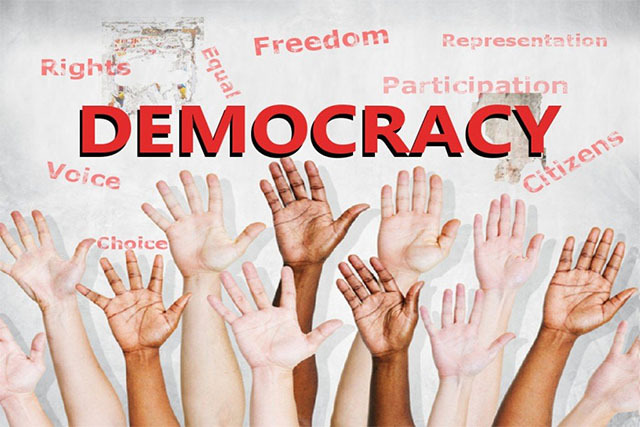Undoubtedly, democracy is the most important factor in stabilization and development of post-conflict countries; on the contrary, there are no kingdoms or autocratic systems being successful in reconstruction of war-torn countries. In fact, today’s crises in Afghanistan are the outcome of those inheritable political systems which were handed over by kings to their heirs and then to their grandsons. While today’s world economic and political powers came out of collective will of people after they decided to move from barbarism and racism to rationalism.
In other terms, Afghanistan has experienced many political systems such as Kingdoms, Italianism, and Centralism and so on, but none succeeded to change the destiny of the Afghan people. The Afghan citizens eagerly want to move towards peace, prosperity and an efficient democratic system; in fact, they are really tired of long-term war and imposed conflicts in their country. In 2001, the new democratic system with intervention of international community was welcomed by all the Afghan people. It means, they realize the needs for strategic partners but they also expect changes and thorough implementation of the agreements.Thus, they anticipate the country leaders not to waste the opportunities came out by several decades of fights and through presence of international allies.
Now many Afghans, especially young generation believe that reaching peace and prosperity is impossible without institutionalizing a decentralized democratic system and rule of law in Afghanistan. In democratic countries, rulers’ decisions are made on the basis of ruling laws and people’s will. Accordingly, the legitimacy of a political system within a country is judged on the basis of lawfulness which is the significant indicator of democratic. If the rulers are negligent to laws and law enforcement, it shows that democracy stabilization and democratic values are not important to them. Therefore, it is pinpointed that foundation of democracy is laid on the basis of lawfulness and people wills.
Based on this, widespread corruption is not only the important manifestation of lawlessness but also the mother of all threats to country’s democracy and sustainable development. Recently, Afghanistan got the fourth place of corrupt country in the world; this has also shown the position of our democracy in the world. However, the Afghan National Unity Government (NUG) repeatedly promised fighting against corruption. Ghani launched a national anti-corruption strategy that rests on five pillars: national leadership; security sector reform; improving the quality of civil service recruitment; and increasing our ability to oversee how money is transferred and spent.
The next feature of democratic system is holding transparent elections; hundreds of developed countries achieved their economic prosperity and political stability through transparent democratic elections. On the other hand, in emerging democracies and post-conflict societies, it has a great potential risk to plunge a country back into violent conflict, to undermine processes of stabilization and to discredit democratization. The presidential elections in Afghanistan in autumn 2009 are one of the recent examples for this risk. Elections are not only a tool of democratic participation but also a severe contest for positions of leadership, power and access to resources.
Generally, the political management experience shows that only way to realizing political and economic stability is transparent election system in a country. Heeding the imperatives and lessons learned by prosperous countries, of being key importance can contribute significantly to reducing these risks. Yet, carried away by abstract, resounding rhetoric on the need for democracy and free and fair elections, politicians and leaders in the Western capitals as well as in international organizations often fail to be serious about implementing them. This is particularly true with regard to safeguarding the independence and integrity of Election Commissions and Electoral Complaints Systems. Moreover, the absence of strong executive entities is another threat to stabilization of democracy in a country.
The other feature of democratic system is freedom of media and freedom of speech; In fact, freedom of media and speech are freedom of thoughts but in conflict or post-conflict countries such as Afghanistan- there is a dire need to promote media literacy as a safeguard against hatred speech in otherwise volatile circumstances. An audience that is educated in the tenants of media professionalism is more likely to demand high quality media content and play active role in institutionalizing of a unifying political literature.
So, media literacy is also important for new or transitioning democracies. In these circumstances legal frameworks are usually under development and will greatly impact the future state of independent and free media. Furthermore, citizens may experience a rather sudden explosion of news sources and media formats after decades or more of controlled and sparse media. The greater the media literacy, the more prepared audiences will be in deciphering messages and recognizing value and credibility. Media literacy builds an understanding of the role of media in society as well as essential skills of inquiry and self-expression necessary for citizens of a democracy.
To end with, democracy means rule of people on people but because of several aforementioned barriers and improper beds, especially lack of modern political culture, role of people is not determining in Afghanistan; The more people are aware of their role, the more they will control the steering of power towards peace and prosperity. Unfortunately, most of the people are unaware of their role in forming governmental system and political decision making process. .So long as they are not rescued from basic economic needs, it does not seem to find chance to think about their secondary needs as participation in political process. Conversely, economic growth causes social classifications motivating them to contribute in political process for their own interests. So, government, as a key actor should prepare the bed for democratization, such as economic growth, security improvement and promotion of political culture.
Home » Opinion » The Main Features of Democracy
The Main Features of Democracy
| Mohammad Zahir Akbari

